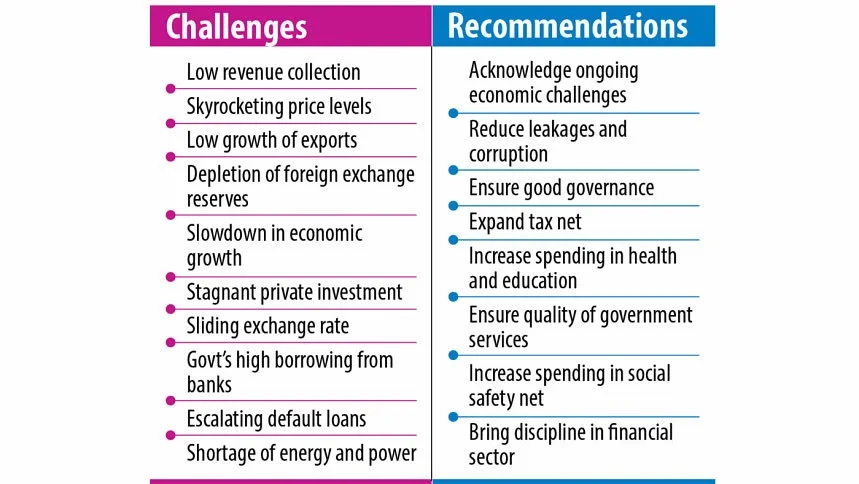Three major barriers to economy’s progress
Share on:

Speakers say strong political will needed to address inefficiency, corruption and a lack of accountability
Strategic inefficiency, institutionalisation of corruption, and a lack of accountability are the three major barriers blocking the smooth progress of the economy, said economists, entrepreneurs and politicians yesterday.
"To solve the existing problems of the economy, the country needs strong political will," said Hossain Zillur Rahman, executive chairman of the Power and Participation Research Centre, a think-tank.
The political will faces barriers such as an environment of no accountability, inefficiency in taking overall strategic steps, and institutionalisation of corruption, he said.
"These barriers need to be broken down for the development of the economy."
His comments came at a dialogue on budget at the Lakeshore Hotel in Dhaka. The Centre for Policy Dialogue (CPD) organised it.
Rahman, a former caretaker government adviser, said the country has a huge deficit in ensuring governance and development strategy.
For instance, job creation has not received the expected focus in the development strategy in the last one decade. "This is an important deficit as it is creating unemployment, and the younger generation is becoming disappointed," he said.
In a survey, the government itself has found that most of the youths are pessimistic about their future, he said.
"The country needs to raise the budgetary allocation for the education and health sectors and strengthen focus on the implementation of the budgetary plans."
Rahman, also the chairman of BRAC, said Bangladesh is trapped by inefficiency. "Ministries are showing their inefficiencies in implementing their budget."
Speaking about the quality of services, the noted economist said education and health-related investments don't just refer to infrastructural development alone. "The quality of education and health services should be upgraded."
He cited hard-working entrepreneurs and economic agents as the two golden geese of Bangladesh's economy. "Do we nurture them?"
"Entrepreneurs need a favourable business climate and reduced bureaucratic red tape.
However, the reality is they are prevalent. In order to solve these problems, a strong political will is essential."
While chairing the dialogue, Syed Manzur Elahi, a noted industrialist and a former caretaker government adviser, said governance is an important issue for the country, and if it can be ensured, 90 percent of problems of the economy will be tackled.
He said there is a leakage in both income and expenditure sides. "If these can be solved, the economy will benefit."
About the inefficiency in the energy sector, Anisul Islam Mahmud, deputy leader of the opposition in Parliament, said the capacity payment is not the main problem of the electricity sector.
"Mismanagement is the main problem. For instance, around 40 percent of power generation capacity has remained unused. Why should I pay for your mismanagement?"
He mentioned the latest chaos related to sending migrant workers to Malaysia. "People have suffered because of a syndicate."
Leakages and corrupt practices should be eliminated, and syndicates should be dismantled for the greater interest of economic development, he said. "Accountability and transparency are key to ensuring good governance in all spheres of society."
Workers and farmers have been offering much-needed lifelines to the economy year after year, but they were not given due importance in the budget, said Razekuzzaman Ratan, assistant general secretary of the Bangladesher Samajtantrik Dal.
"Owing to higher inflation, their purchasing power is falling. As a result, they have either reduced their consumption or are working long hours."
The politician recommended providing essential goods at discounted rates.
Rasheda K Choudhury, executive director of the Campaign for Popular Education, said Bangabandhu Sheikh Mujibur Rahman once said that investing in education is the best form of investment. "What is the current investment scenario in this sector?"
Although the government frequently talks about Bangabandhu's dream, its reflection was not seen in the education budget, she said.
"To find out the allocation for research, a microscope will be needed. How will then Bangladesh become a developed nation? The budget has not focused on ensuring the quality of education."
Rumeen Farhana, a former whip of the Bangladesh Nationalist Party, said if someone does not pay proper tax mistakenly, black money is created. The money should be allowed to legalise at a usual rate, not at 15 percent.
"If someone amasses wealth illegally, the tax should be much higher."
Kazi Nabil Ahmed, chairman of the parliamentary standing committee on ministry of posts, telecommunications and IT, acknowledged the importance of creating a more conducive business climate and raising skills.
MA Mannan, A former planning minister, said the country has some bright spots such as the development of the agriculture sector and higher spending on social safety net programmes.
"In my village, people don't want democracy -- they want sanitary latrine. They want tubewells to obtain the supply of drinking water."
Regarding the selection of development projects, he said some projects are undertaken even when their importance is low.
Fahmida Khatun, executive director of the CPD, said the overall macroeconomic targets set for FY25 did not take into cognizance the current realities and are too optimistic.
"Therefore, the credibility of the proposed fiscal framework for the next fiscal year remains questionable," she said, adding that the measures for curbing inflation and providing relief to the poor and fixed-income people are inadequate.
There is major inefficiency in government expenditure, so project costs are high, said Dewan Hanif Mahmud, editor of the Bonik Barta. "Rent-seeking also raises costs."
Rent-seeking occurs when an entity seeks to gain added wealth without any reciprocal contribution of productivity.

